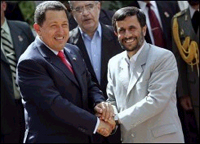Nonaligned governments meet in Cuba to discuss poverty and Middle East
Leaders from Iran, Venezuela, Syria and India, among 50 others, are expected to attend to the summit.

Over 100 nonaligned governments will discuss poverty, health care and the current situation in Middle East during a weeklong summit that began Monday in Havana and will culminate with the meeting of 50 heads of states, most of them critics of US war on terror. According to Cuban organizers, the leaders of Iran, Venezuela, Syria and India are expect to attend, while the attendance of ailing host Fidel Castro is still up in the air.
Cuba takes over the chairmanship of the Nonaligned Movement, a cold war era organization created as a Third World alternative to the United States and Soviet Union, to deepen the bond between member nations that share similar social and economic struggles.
"Today we can affirm ... that the movement is more necessary than ever," said Cuban Foreign Minister Felipe Perez Roque at the opening session. "We need the united force of 118 nations," he added, referring to the current members plus Haiti and St. Kitts and Nevis, expected to join the movement this week.
Reports from Havana say that organizers will look for a final declaration aiming to reject all terrorism against civilians, including state terrorism, in an attempt to reprove Israel and the United States for the invasions of Lebanon, Iraq and Afghanistan.
However, individual members are expected to make use of the summit for their own purposes, as it is usual in this kind of events. As Iran will try to gain support for its nuclear program, Pakistan an India leaders will meet as part of their peace process.
Venezuela’s Hugo Chavez will arrived in Cuba later in the week to campaign against US imperialism, as Cuba is expected to introduce in the final document a condemn of the US blockade that harass its economy since 1962. Illiteracy, lack of access to decent health care and energy conservation are also high on Cuba's agenda.
As UN Secretary-General Kofi Annan will attend as an observer, Cuban organizers said they would urge the United Nations leadership to strengthen its loyalty to developing countries. China will also attend as an observer and will send a delegation to Cuba.
Anti-Castro humanitarian groups or individuals active in Cuba are expected to make public their claims on the Island’s human rights situation.
Hernan Etchaleco
Pravda.ru
Subscribe to Pravda.Ru Telegram channel, Facebook, RSS!




